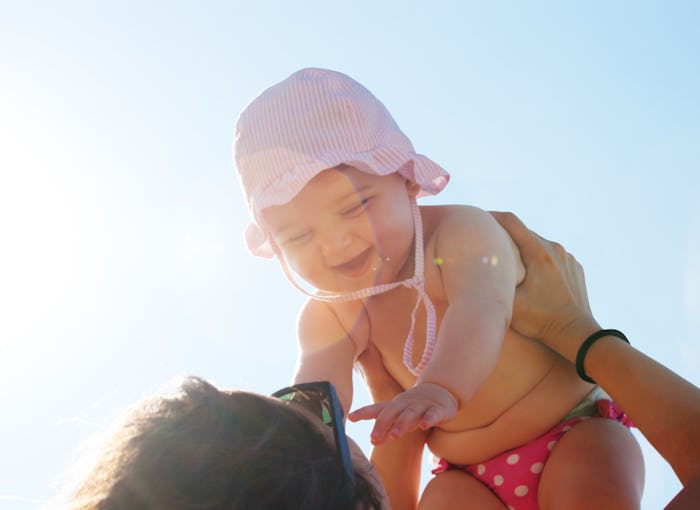Life

Here's What Experts Want You To Know Before You Take Your Baby Outside
I don't know about you, but I consider any beautiful, sunny day to be a prime opportunity to snag a little Vitamin D. When you have a baby, however, a sunny day can seem somewhat ominous. After all, even if it doesn't feel like the sun is doing some damage, it can be. Your baby's delicate skin is extremely vulnerable to those harsh UV rays, even on a cloudy day. So, can your baby get a sunburn? The answer isn't all that surprising, because babies are human beings, but some of the ways to avoid sunburning your baby are worth paying special attention to.
The Skin Cancer Foundation recommends no baby under the age of 6 months be exposed to the sun. The foundation also adds that children over 6 months of age (and/or their parents, caregivers, etc.) should take every precaution available to avoid sunburn, including the use of sunscreen, hats, and UV-filtering sunglasses. So, yes, it's absolutely possible for your baby to get a sunburn, and you should make it a point to take the necessary steps to keep them safe.
Studies highlighted by The Skin Cancer Foundation indicate how dangerous those UV rays really are, particularly in infants under 6 months of age when the skin is most vulnerable. The Skin Cancer Foundation also goes on to highlight other ways to avoid the sun's harmful damage, including wearing protective clothing and seeking shade when the sun is at its most intense (between the hours of 10:00 a.m. and 4:00 p.m.). It's also a good idea to investigate how much sun is coming through the backseat of your car, where unintended sun exposure may occur. Consider investing in a UV shade to block some of that sunlight out, too, just to be safe.
If your baby were to get a sunburn, there are some things you can do to alleviate symptoms and discomfort. Alan Greene, doctor and fellow of the American Academy of Pediatrics (FAAP) from American Baby, stresses the importance of after-care. Green told Parents that taking gentle, thoughtful care of your baby's skin after sun exposure helps repair any potential damage. Giving lukewarm baths to help cool the skin, and using moisturizer with aloe vera, for example, will cool things off. Your doctor may even suggest medication (such as acetaminophen) if the sunburn appears painful or uncomfortable. Of course, it's worth noting that you should always consult with your child's pediatrician before administering any medication.
If you aren't sure if your baby's been burned — because it can sometimes take six to 12 hours for a sunburn to fully appear — using a cool compress right away may help lessen the extent of the burn. In the case of blisters, fever, chills, or headache, however, Healthy Children (in accordance with the American Academy of Pediatrics) urges parents to seeks medical attention immediately. Some sunburns may be labeled as "severe," which could require hospitalization, so it's best not to wait it out if you think your baby has an extreme sunburn.
Luckily, sunburn is preventable. By dressing your baby in protective wear, keeping them out of the sun (especially during the hottest part of the day), or avoiding the outdoors as much as possible through those first six months of life, you won't have to worry and your baby should be safe. If, however, you notice any of the above symptoms, call your doctor. When it comes to your baby, it's always better to be safe than sorry.